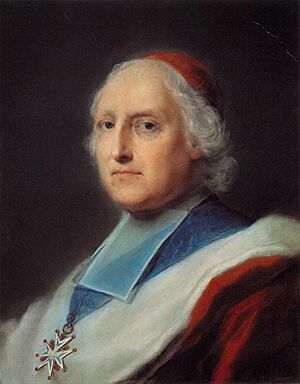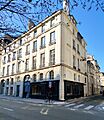Melchior de Polignac facts for kids
Melchior Cardinal de Polignac (born October 11, 1661 – died November 20, 1742) was an important French diplomat, a Cardinal in the Catholic Church, and a poet who wrote in Neo-Latin (a modern form of Latin). He was born at Chateau de la Ronte, near Puy en Vélay, in a region of France called Auvergne. His father was Armand XVI, marquis de Polignac, and his mother was Jacqueline de Beauvoir-Grimoard-de Roure.
Contents
Early Life and Education
Melchior was a very smart child. His uncle took him to Paris, where he studied at the Jesuit Collège de Clermont. Later, he went to the Collège de Harcourt. There, he became a follower of Cartesianism, a philosophy based on the ideas of René Descartes. This was the opposite of what his teacher, who liked Aristotle, tried to teach him!
In 1683, he wrote his final paper in Theology at the Sorbonne. It talked about kings who removed "high places," which were old religious sites. This was a sensitive topic because King Louis XIV was planning to revoke the Edict of Nantes soon after. This edict had given rights to Protestants in France.
A Career in Diplomacy
Melchior de Polignac started his career as a diplomat at a young age. He caught the attention of Cardinal Emmanuel de la Tour d'Auvergne de Bouillon. The Cardinal took Polignac with him to Rome in 1689 when a new Pope was being chosen. Polignac helped the Cardinal and the French Ambassador improve relations between France and the Pope.
In 1693, Polignac was sent as an ambassador to Poland. He worked to help a French candidate, François-Louis de Bourbon, prince de Conti, become the new king of Poland. However, another candidate, Augustus the Strong, supported by Austria and Russia, won the election instead. This made Polignac temporarily fall out of favor with the French king. He had to retire for a while, but in 1702, he was back in good standing.
In 1709 and 1712, he was part of important peace talks. He helped negotiate the Congress of Utrecht, which finally brought peace to Europe.
Joining the Academies
Melchior de Polignac was also known for his intelligence and writing. On May 26, 1704, he was chosen to be a member of the Académie Française. This is a very famous group that protects the French language. He also became a member of the Académie royale des sciences in 1715 and the Académie des Inscriptions et Belles-Lettres in 1717.
He started writing a long poem in Latin called Anti-Lucretius. It was meant to argue against the ideas of an ancient Roman poet named Lucretius. He didn't finish it, but it was published after he died and was quite popular in the 1700s.
Becoming a Cardinal
Pope Clement XI noticed Polignac's talents. In 1706, he named Polignac an Auditor of the Rota, which is a high court in the Church. In 1712, the Pope secretly made him a Cardinal Deacon. This was kept quiet because Polignac was negotiating peace in a Protestant country, and they didn't want to cause any problems. His appointment was announced publicly in 1713.
He became a full Cardinal Priest in 1724. He also served as the French representative to the Pope in Rome for eight years, from 1724 to 1732. He attended several meetings where new Popes were elected, called Conclaves.
Later Life and Death
During the last years of King Louis XIV's reign, Polignac was the Master of the King's Chapel. After the king died, Polignac was involved in a political plot. Because of this, he was sent away to Flanders for three years. However, when the young King Louis XV grew up, Polignac was brought back and given his positions again. In 1726, he became the Archbishop of Auch.
Melchior de Polignac died in Paris on November 20, 1742, when he was 80 years old. He was buried in the Church of S. Sulpice in Paris. After he died, Frederick the Great, a king from Prussia, bought his large collection of marble statues.
Images for kids
 | Shirley Ann Jackson |
 | Garett Morgan |
 | J. Ernest Wilkins Jr. |
 | Elijah McCoy |



